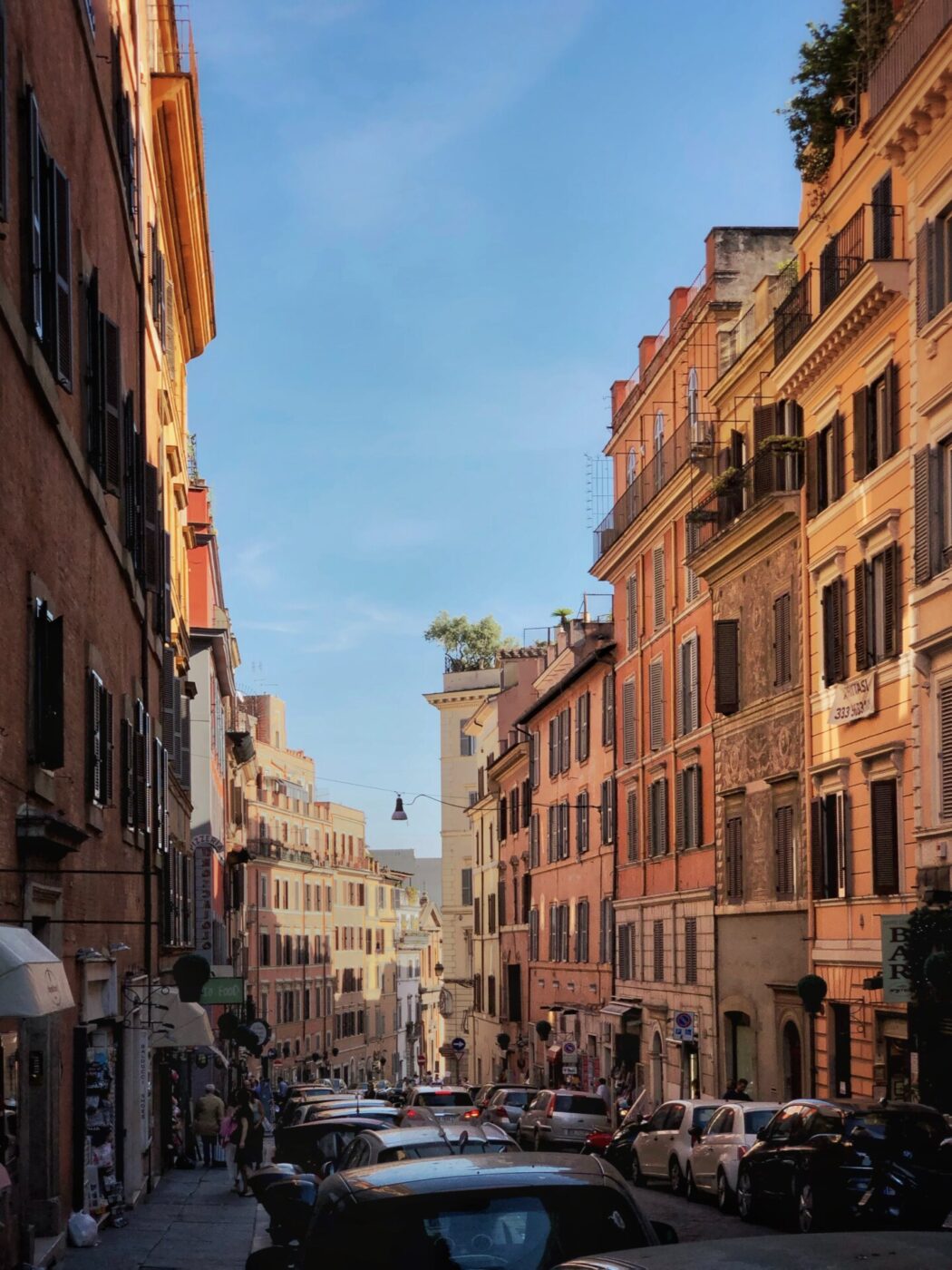It’s a glorious morning in Rome. Although it’s still winter, the sun shines so brightly that I have to take my coat off. Sporty tourists have gone further and are walking around wearing just t-shirts. Passing by the Pantheon, I even notice a guy in shorts, taking a selfie with his girlfriend. Not too far away, people are grouping up outside the church of San Luigi dei Francesi to see the Caravaggios inside.
Energized by the incoming spring, I turn the corner and head to Caffè Sant’Eustachio for an espresso. As soon as I get there, I realize I’m clearly not the only one to have such an idea: the bar is packed. A loud horde is disorderly amassed at the entrance of the Caffè, waiting to order or to pay for their breakfast. Every table outside is ironclad. At times, a waiter emerges from the crowd, frantically taking orders before disappearing inside again.
While the complete absence of a queue doesn’t surprise me–we’re in Rome, after all–the situation is so chaotic that I struggle to understand how to reach the counter.

Unconcerned by the throng around us, the elegant man in front of me is killing time by taking some calls–every sentence is louder than the previous one, so that I overhear the whole conversation. Apparently, someone is going to be sued very soon.
A disheveled woman in a white puffer jacket emerges from the back of the bar, shouting at someone behind me: “Caterina! Caterina!!! Vieni a prenderti il caffè! Sta qui!” (“Caterina! Caterina!!! Come take your coffee! It’s here!”) I’d love to turn around to check if Caterina is wearing a matching white puffer herself–I bet she is–but at this point I simply can’t move anymore.
I am seriously contemplating giving up, but instead I decide to resort to my strategy for such emergencies ever since I’ve moved back to my home country: I pretend to be a foreign tourist, faking my best British accent to get out of any tricky situation. Italians, I’ve noticed, tend to become immediately kinder to tourists, especially if you attempt to speak their language, and I usually get what I need nice and easy. I’ve gotten away with impersonating a Brit at restaurants, shops, museums, and even at the post office once.
Still imprisoned in the mob at Caffè Sant’Eustachio, I tap a tall man ahead of me who’s miraculously been able to reach the counter, and ask him to order, first in uber-polite English, then in my best British-guy-trying-to-speak-Italian language: “Scus, comO posso ordinA?” (“Excuse me, how can I order?”) Before I’m able to congratulate myself for my acting skills, the man looks at me and, while mimicking the act of drinking, asks: “Uot iu uant?” “UnO espresso, pOr favorI.” (“An espresso, please.”) He turns around, gets the attention of the barista, and orders my coffee before pushing his way back through to the exit: “Giova’, me fai n’artro espresso pe’ ‘sto ragazzo qua? Me sa che è ’nglese. Grazie, eh! Se vedemo domani.” (“Giovanni, can you make another espresso for this guy here? I think he’s British. Thank you. See you tomorrow.”)
Sipping my (well-deserved) coffee, finally free from the cafè’s mayhem, I meditate about the privileged relationship between Italians and chaos.
Every Italian knows that life in our country is a constant battle against anarchy.
Most of our every-day lives are shaped by circumstances that hardly make sense at all, starting with our language: from our treacherous 21 tenses to nouns that change gender according to their number. Perfectly normal to us are businesses closed on Mondays (or Tuesdays, or during lunch time, or in August, or when it rains, or when it’s the owner’s kid’s birthday… ), our fleeting concept of personal space, cutting pizza with butter knives.
And let’s just skip the fact that we are anthropologically unable to queue anywhere and that we communicate in loud and theatrical fashion. These quirks are too-well-known features of our national character that contribute to the disorder we create whenever we’re around. They will hardly ever change. Rather, they add that little spice to any menial errand. Why should we orderly wait for our turn at the post office, when instead we can come up with so many ingenious ways of skipping the line? And why should we respect traffic rules that keep smothering our strong sense of imagination? (I don’t even want to mention the rotonda, or roundabout.)

Bureaucracy, onto which our very ontology is built upon, may be the biggest source of chaos in our life. Local administrations seem to work in a completely disjointed way from the central government, renewing an ID takes as long as obtaining the authorization to build a nuclear plant, and what about marche da bollo, those tax stamps still required to validate official documents, which come in so many different values that they seem to be designed with the sole purpose of confusing people?
Inevitably, red tape slows down everything–from home ownership, to life-saving surgeries, to the legal system–to a state of near paralysis. An average case in court lasts 2,807 days. Yes, seven and a half years: enough time for a baby to grow up and realize there’s something wrong there.
In his formidable book on Italians, Luigi Barzini told of claims for damages caused by Giuseppe Garibaldi and his soldiers to properties in Sicily in 1860 that were still being paid in 1954, 96 years later, in amounts that had lost all value and meaning, to heirs who had forgotten the reason why they were entitled to such compensations.
I’ve always suspected that one of the reasons Italian society is this chaotic is that it offers constant opportunities to reinforce our cultural identity. The fact that fixing an appointment at the hospital or paying a bill is so unnecessarily complicated forces us to find ways around the issue, stimulating the creativity for which we’re renowned worldwide. Family, the very fundative element of Italian culture, is involved in this. No matter what’s the problem, there will always be an uncle with some friends at that ministry, or a relative working at that hospital ward, with the power of helping us skip a line or receive all sorts of favors. After all, it’s not by chance that the most enduring institution in the country, the Catholic Church, ran for centuries thanks to nepotism. (Family itself is also capable of causing mind-bending bedlam: have you ever sat for an Italian Sunday lunch?)
So, every time you have to fight your way to get a cappuccino, just relax and enjoy the ride. Because, paraphrasing the late Gina Lollobrigida in Come September: “We don’t have to make sense! We’re Italian!”


